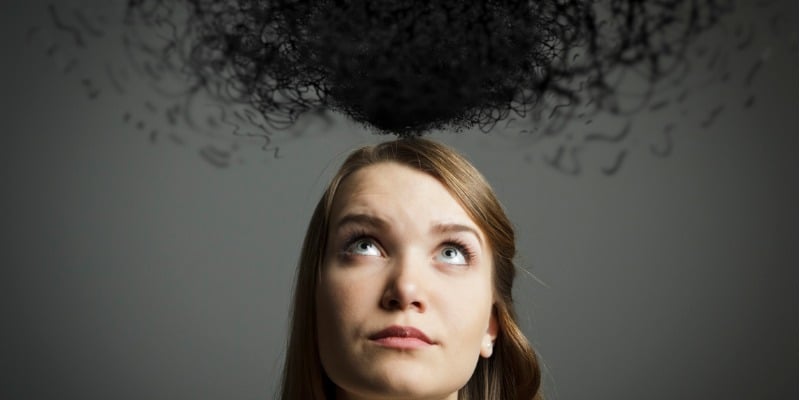
We get so many mixed messages about depression it can be difficult to separate what’s real from what’s bogus. When it comes to depression, however, believing the following myths can keep you mired in sadness, hopelessness, and despair and can prevent you from getting the help you need.
Myth #1: Antidepressants are the only cure for depression.
Fact: Since Prozac hit the market in 1987, antidepressant use among Americans has skyrocketed by 400% and over 1 in 10 Americans are currently popping a pill to try to ease their depression. But it isn’t always working. In fact, a 2014 study from researchers in the UK found that over 50% of depressed patients still experienced symptoms after being treated with antidepressants. And about one-third of people still felt blue after trying four different antidepressants.
Antidepressants should never be the first and only treatment for major depressive disorder. There are many natural ways to overcome symptoms, including nutritional supplements, neurofeedback, physical exercise, nutrition, ANT therapy (questioning negative thoughts), practicing gratitude and appreciation, surrounding yourself with people who provide positive bonding, and finding your purpose and passion.
Myth #2: Depression is something you can will yourself to snap out of.
Fact: The notion that you can shake off depression the way you might shake off feeling down after losing a point in tennis is flat-out wrong. You can’t will yourself to stop feeling depressed the same way you can’t will yourself to stop having diabetes, heart disease, or nearsightedness. Believing that you should be able to get over it through willpower alone sets you up to feel like a failure, which will only make depressive symptoms worse.
Myth #3: Men don’t get depressed.
Fact: Women are twice as likely to be diagnosed with depression, but according to the National Institute of Mental Health, an estimated 6 million men suffer from the condition each year. Mood disorders like depression may be overlooked in men in part due to a lack of willingness to talk about their feelings as openly as women. In addition, males don’t always display the symptoms we typically associate with depression, such as sadness, fatigue, or hopelessness. Men are more apt to exhibit anger, aggression, and irritability or to engage in reckless behavior, such as substance abuse.
Myth: Men don’t get depressed. Fact: Women are twice as likely to be diagnosed with depression, but an estimated 6 million men suffer from the condition each year. Click To TweetMyth #4: Depression is all in your head.
Fact: Depression is not an imaginary illness, but it is in your head—in your brain. Brain imaging studies using a technology called SPECT show that people with depression tend to have abnormal activity in an area of the brain called the limbic system. Brain scans reveal that when there is too much activity in the limbic system, it is often correlated with a tendency toward negativity, chronic guilt, crying spells, and feelings of helplessness and hopelessness. In a SPECT study of more than 15,000 patients, researchers at Amen Clinics noted a significant correlation between increased activity in this brain region and self-reporting of symptoms of depression.
Myth #5: Sad events are the only cause of depression.
Fact: Stressful life events, such as the death of a loved one, marital problems, family dysfunction, financial difficulties, or health problems may lead to feelings of unhappiness, but they don’t always trigger depression. Many other things in life are associated with an increased risk of developing depressive symptoms. A family history of mood disorders, early childhood trauma, physical ailments, and substance abuse can increase the risk of developing depression. In addition, mild traumatic brain injuries are a major cause of depression that ruins people’s lives, but very few people knew about it… because only a handful of psychiatrists ever look at the brains of their patients.
Myth #6: People who are successful don’t get depression.
Fact: Depression doesn’t discriminate. It can affect anyone—even people who are highly accomplished in their field. Doctors, professional athletes, and even major celebrities can struggle with the condition. Think of people like Kate Spade or Anthony Bourdain, who seemed to have it all but took their own lives. People who appear to have so much often think they don’t have a right to feel depressed. But no amount of material wealth or external validation can heal the emptiness you feel inside or balance abnormal brain activity. Treating the depression is the only way out of the darkness.
Myth #7. The same depression treatment works for everyone.
Fact: Based on brain imaging research, it is very clear that giving everyone with depression the same one-size-fits-all-treatment plan will never work. Antidepressants, for example, may help some people but can make others worse. This is because brain scans reveal that there are 7 types of depression, and each type has its own treatment needs. In addition, each person may have other factors contributing to their condition—such as hormonal dysfunction, gut imbalances, head injury, a poor diet—that need to be addressed. Finding a treatment plan that is tailored to your needs is the key to overcoming your symptoms.
Depression, anxiety, and other mental health issues can’t wait. At Amen Clinics, we’re here for you. We offer in-clinic brain scanning and appointments, as well as mental telehealth, clinical evaluations, and therapy for adults, teens, children, and couples. Find out more by speaking to a specialist today at 888-288-9834 or visit our contact page here.





How is depression related to hording? Want to discuss this with friend but no real support from her family. Her mom passed away and she was the main care giver.
Comment by Alyson Fitsimmons — November 15, 2019 @ 5:42 PM
In my personal experience as a main caregiver several years ago, it was about overwhelm combined with the inability to let go. I didn’t hoard but I’ve always been well organized; during and after that time I let EVERYTHING get out of control. I just couldn’t face it. I used a book by Julie Morgenstern called Organizing From The Inside Out which addresses the psychological aspects of disorganization FIRST. It was tremendously helpful at the time. It lessened my feeling of overwhelm and helped me get my physical space calm which in turn helped me get my mind calm.
Comment by Lisa A Moran — November 20, 2019 @ 5:08 AM
LARGE PRINTS I NEED TO SEE. TRIED MANY MEFS FIR ANTI DEPRESSANTS STARTED AND STOPPED 2.
Comment by Mark Therrien — November 20, 2019 @ 6:06 AM
Noticed this about neighbor friend who lost her mom yr ago and needs to go live w daughter She shops for God knows what Says it’s retail therapy and now has all this Stuff to get rid of
Comment by Gail — November 20, 2019 @ 10:55 AM
What treatment do you recommend for constant SNRI and SSRI withdrawal syndrome?
Comment by Danita Dunkin — November 20, 2019 @ 12:18 PM
I’m very depressed ,not taking any medication
Comment by Dalit Tayar — November 20, 2019 @ 7:37 PM
Robin Williams was not “simply” a depressed famous entertainer with an empty life. Mr. Williams had Lewy Body Dementia, and according to what doctors who did the autopsy, he likely had no idea what the results of his actions would be. He was originally diagnosed with Parkinson’s Disease, which has as a symptom, depression, but autopsy proved otherwise. I suggest that if you have any brain injury or neurological disorder, ie epilepsy, Parkinson’s Disease, MSA, PSP, Huntington’s, etc, that you seek out someone who is willing to do a comprehensive work up to identify possible depression, and then seek out quality treatment. Depression can be, and often is, a very serious health issue which seems to be at a critical high these days. If you have symptoms take responsibility to seek treatment without waiting.
Comment by Teresa Baker — November 20, 2019 @ 10:04 PM
My 28 year son, suffers from low self esteem and is self medicating. Many rehab experiences and tried vivitrol, need a brain SPEC
Comment by Sid Greenspan — November 23, 2019 @ 1:28 PM
In June of 2015 my husband shot and killed himself, he wasn’t working any longer due to a car accident in Nov of 2009. His entire family blames me for his death because I was working two jobs to keep bills and house payments up. They said I was having an affair because I was also a 4H leader for Mingo County and we would go on retreats and post pictures but the 4H agent was a friend of 19 years. My husband suffered a traumatic brain injury in the accident and he was never the same. He belonged to a biker organization a tough guy let everything roll off his back, after the accident he would cry at the drop of a hat, he showed emotion that he never showed before. The doctors didn’t see what I was seeing, he couldn’t remember me on some days he knew I belonged there but didn’t know my name or the kids name everyone was hey girl or hey buddy and everyone came to think that was normal but he would come into the house and I would ask him who was you talking to outside and he’d say the guy in the red truck but never knew the name. When he died I lost everyone in his family they all blamed me. Life is hard when I try to go back to my home town. Thank you for this article, I needed it today.
Comment by alice byus — May 6, 2020 @ 7:07 AM